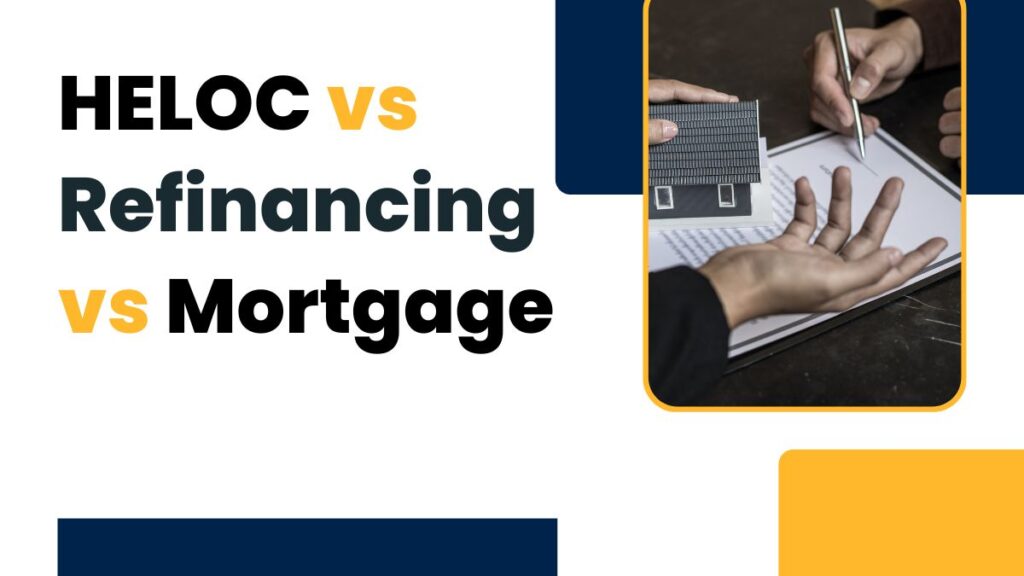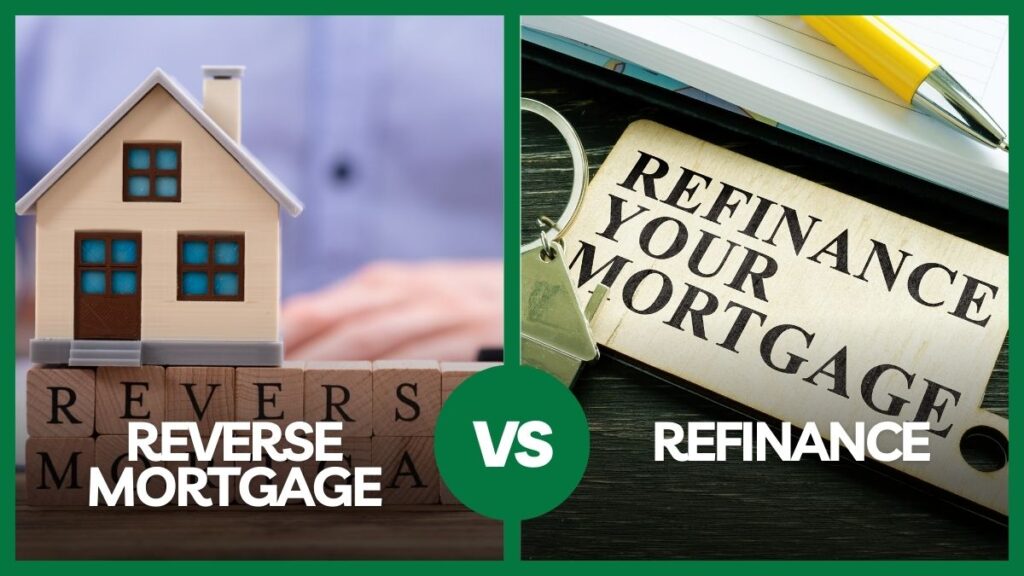Not sure if a HELOC, refinancing, or mortgage is right for you? Whether you want to renovate your home, lower your payments, or buy a new house, it’s important to understand the differences.
Maybe you need cash for a project, want to save on your monthly mortgage, or are looking to buy your first home. Each option has its own pros and cons. In this guide, we’ll explain each one in simple terms to help you choose the best fit for your needs. Let’s get started!
HELOC vs Refinancing vs Mortgage Statistics
Did you know mortgage refinancing accounts for a significant portion of home financing solutions? Explore the latest stats on HELOCs, refinancing, and mortgages to see where you fit in!”
| Criteria | HELOC | Refinancing | Mortgage |
| 1. Interest Rates | 5.5% to 7.5% (variable) | 4.5% to 6.5% (fixed or variable) | 4.0% to 6.0% (fixed-rate typically) |
| 2. Loan Term | 10 years (revolving) | 15 to 30 years | 15 to 30 years |
| 3. Minimum Credit Score | 620 or higher | 650 or higher | 600 to 700 |
| 4. Minimum Home Equity | 20%+ | 20%+ | 5% for first-time buyers |
| 5. Maximum Loan-to-Value (LTV) | 80% | 80%+ | 80% (up to 95% for first-time buyers) |
| 6. Prepayment Penalty | Low to none | Yes, depending on terms | Yes, if breaking early |
| 7. Closing Costs | Low (no full mortgage application fees) | Higher (around 3-5% of loan) | Higher (around 3-5% of loan) |
HELOC
A HELOC is a loan that lets you borrow money based on the value of your home. It works like a credit card — you have a limit, and you only pay interest on what you borrow.
How does a HELOC work?
You get access to a set amount of money and can borrow when you need it. You only pay interest on the amount you use. After a certain period (usually 10 years), you’ll start paying back the money you borrowed.
Advantages of a HELOC
Flexibility: Borrow and pay back money as needed.
Tax benefits: Interest may be tax-deductible if used for home improvements.
Lower interest rates: Typically cheaper than credit cards or personal loans.
Emergency cash: A quick way to access money if needed.
For many uses: Good for home improvements, debt, or large expenses.
Lower payments at first: Early payments may only include interest, so they can be lower.
Disadvantages of a HELOC
Variable rates: Payments may rise if interest rates increase.
Risk of overspending: It’s easy to borrow more than you can repay.
Credit score impact: Missing payments can hurt your credit score.
Risk to your home: If you don’t repay, you could lose your home.
Extra fees: Some HELOCs come with fees.
Short repayment period: After the borrowing period, you may have to pay back the loan faster.
Eligibility for a HELOC
Home equity: You need at least 15-20% equity in your home.
Credit score: A good credit score (usually 620 or higher).
Income: Lenders need to see that you have a steady income.
Debt-to-income ratio (DTI): Lenders prefer a DTI under 43%.
Primary residence: The home should be your main place of living.
A HELOC can be a helpful option if you need extra money, but be careful to borrow only what you can repay.
Refinancing
Refinancing means getting a new loan to replace your current mortgage. It can help you get a better interest rate, change how long you’ll pay, or borrow extra money.
How does refinancing work?
You apply for a new loan, which pays off your current mortgage. Then, you make payments on the new loan with new terms, like a lower rate or a shorter term.
Advantages of Refinancing
Lower monthly payments: You might pay less each month.
Pay off faster: You could shorten your loan and pay it off quicker.
Get extra cash: You can borrow money for things like home improvements.
Fixed payments: A fixed rate keeps your payments the same.
Consolidate debt: You can combine your mortgage with other debts into one payment.
Disadvantages of Refinancing
Closing costs: Refinancing can come with fees.
More interest over time: A longer loan term means you may pay more in interest.
Credit score dip: Your credit score might drop a little.
Longer payments: You could end up paying for a longer time.
Eligibility for Refinancing
Home equity: You need some equity in your home (usually at least 20%).
Good credit: A higher credit score can help you get better rates.
Stable income: You need to show you can afford the new loan.
Low debt: Your debt should be low compared to your income.
On-time payments: Having a good payment history helps.
Refinancing can save you money or help with other needs, but it’s important to understand the costs first.
Mortgage
A mortgage is a loan used to buy a home. You pay it back over time with monthly payments.
Types of Mortgages
Fixed-rate mortgages: The interest rate stays the same for the entire loan.
Adjustable-rate mortgages (ARMs): The interest rate can change after an initial fixed period.
How does a mortgage work?
You borrow money to buy a house and pay it back with monthly payments over a set time, like 15 or 30 years.
Factors to Consider When Choosing A Mortgage
Down payment: The more money you pay upfront, the less you borrow.
Interest rate: Decide between a fixed rate (same rate all the time) or a variable rate (which can change).
Loan term: Mortgages are usually 15, 20, or 30 years long.
Monthly payments: Make sure the monthly payments fit your budget.
Advantages of Each Type of Mortgage
Fixed-rate mortgages:
- Stable payments: Payments stay the same throughout the loan.
- Predictable: You always know how much you need to pay.
- Disadvantage: May have a higher interest rate than ARMs at first.
Adjustable-rate mortgages (ARMs):
- Lower starting rate: ARMs often have a lower rate at first.
- Disadvantage: Rates can go up after the fixed period, making payments harder to plan.
Additional Advantages of Mortgages
Build equity: As you pay, you own more of your home.
Tax benefits: You may get tax breaks on the interest paid.
Homeownership: Owning a home can be a good investment.
Disadvantages of Mortgages
Interest costs: Over time, you may pay a lot in interest.
Upfront costs: Closing fees and inspections can add up.
Risk of foreclosure: If you miss payments, you could lose your home.
When to consider a mortgage?
Fixed-rate: Good if you want stable payments and plan to stay long-term.
Adjustable-rate: Best if you plan to move or refinance soon.
Eligibility for a Mortgage
Credit score: Lenders look for a good credit score.
Down payment: The more you can pay upfront, the better.
Income: Lenders want to make sure you can afford the payments.
Debt: Lenders prefer you to have low debt compared to income.
Key Tips Before Getting a Mortgage
Compare rates: Shop around to find the best deal.
Understand costs: Look at the total cost over time, not just the monthly payment.
Think long-term: Consider how long you want to stay in the home before choosing the type of mortgage.
A mortgage can help you buy a home, but it’s important to understand the costs and choose the right type for your situation.
HELOC vs Refinancing vs Mortgage
HELOC, refinancing, or a mortgage – which one fits your financial needs? Uncover the key differences and make the smartest choice for your future!
| Criteria | HELOC (Home Equity Line of Credit) | Refinancing | Mortgage |
| Purpose | Borrow against your home’s equity for various expenses. | Replace your current mortgage with a new one. | Borrow money to purchase a new home. |
| Loan Type | Revolving line of credit (like a credit card). | A new loan to pay off an existing mortgage. | A loan to finance the purchase of a home. |
| Interest Rates | Variable rates that can change over time. | Fixed or variable rates depending on your choice. | Fixed or adjustable rates depending on the mortgage type. |
| Loan Term | Typically 10 years of borrowing, followed by a repayment period. | Varies (usually 15, 20, or 30 years). | Varies (usually 15, 20, or 30 years). |
| Repayment | Flexible; you can borrow and repay as needed. | Fixed monthly payments for the new loan term. | Fixed monthly payments. |
| Loan Amount | Depends on the equity you have in your home. | The remaining balance of your original loan or more. | The total price of the home minus your down payment. |
| Eligibility | Requires home equity and good credit score. | Requires sufficient equity and good credit score. | Requires good credit score and down payment. |
| Advantages | Flexible borrowing, tax-deductible interest for home improvements. | Lower rates, shorter terms, or access to home equity. | Predictable payments, long-term ownership of a home. |
| Disadvantages | Variable interest rates, risk of overspending, can hurt credit if misused. | Closing costs, potential for higher overall interest if you extend the loan term. | High interest payments, upfront costs like down payment and closing fees. |
| Best For | Home improvements, debt consolidation, unexpected expenses. | Lower monthly payments, changing loan terms, or accessing home equity. | Purchasing a new home. |
| Impact on Credit Score | May lower your score if overborrowed or missed payments. | Can slightly lower credit score due to hard inquiry. | Can affect your score if payments are missed or credit used improperly. |
| Tax Benefits | Interest on home improvements may be tax-deductible. | Potential tax deductions on mortgage interest. | Mortgage interest is often tax-deductible. |
How AJP Mortgage Can Help?
AJP Mortgage is here to guide you through all your home financing options — HELOCs, refinancing, and mortgages. Here’s how they can help:
Clear Guidance
AJP Mortgage will explain your choices in simple terms. Whether you’re considering a HELOC to tap into your home’s equity, refinancing to get a better rate, or looking for a new mortgage, they’ll make sure you understand your options.
Personalized Support
They’ll look at your income, home value, and credit score to suggest the best option for you. No matter what your situation is, they’ll help you make the right decision.
Best Rates and Offers
AJP Mortgage works with a network of lenders, so they can find competitive rates to save you money. Their goal is to ensure you get the best deal possible.
Easy Application Process
They make applying for loans straightforward. From gathering documents to getting your loan approved, AJP Mortgage will be with you every step of the way.
Continued Support
Even after you get your loan, AJP Mortgage continues to help with any questions or advice you need down the road.
Real-Life Case Studies: How AJP Mortgage Has Helped
Discover how AJP Mortgage, as trusted home equity lenders, has transformed lives! Explore real-life case studies of clients we’ve helped achieve their financial goals.
Case Study 1: Lower Monthly Payments with Refinancing
Client Situation: Sarah and David were paying high interest on their mortgage. They wanted to reduce their monthly payments.
AJP Mortgage’s Solution: They refinanced with AJP Mortgage, securing a lower interest rate.
Outcome: Their monthly payment dropped by over $300, making their budget easier to manage.
Case Study 2: Renovating with a HELOC
Client Situation: Jennifer wanted to renovate her kitchen but didn’t have enough cash.
AJP Mortgage’s Solution: AJP Mortgage recommended a HELOC, letting Jennifer borrow against her home’s equity.
Outcome: Jennifer updated her kitchen and could repay the loan over time, enjoying lower interest rates compared to personal loans.
Case Study 3: First-Time Homebuyers
Client Situation: Mark and Lisa were buying their first home but weren’t sure which mortgage to pick.
AJP Mortgage’s Solution: They chose a fixed-rate mortgage with a manageable down payment.
Outcome: Mark and Lisa moved into their new home with predictable payments and peace of mind.
Why Choose AJP Mortgage?
Expert Advice: They’ll help you choose the best loan for your situation.
Clear Process: You’ll always know what to expect during the loan application process.
Successful Clients: AJP Mortgage has helped many people find the right financial solution for their homes.
Whether you need a HELOC, want to refinance, or are ready for a new mortgage, AJP Mortgage is here to make the process easy and stress-free!
Key Takeaways
HELOC: Great for quick borrowing against your home’s equity, especially for things like home repairs or debt. However, the interest rates can change, and it’s easy to borrow too much.
Refinancing: When you replace your current mortgage with a new one to get better terms, such as a lower interest rate or access to equity. This can help with lower monthly payments, but there are fees involved.
Mortgage: Used when buying a home. You can choose between a fixed-rate mortgage (stays the same) or an adjustable-rate mortgage (changes over time). The best option depends on what fits your financial plans.
When to Choose Which?
HELOC: Best for home improvements or handling urgent expenses.
Refinancing: Great if you want to lower your payments or access your home’s value.
Mortgage: Necessary when buying a new home.
Not sure which option is right for you? AJP Mortgage is here to help. Contact us today to explore your best choices!


